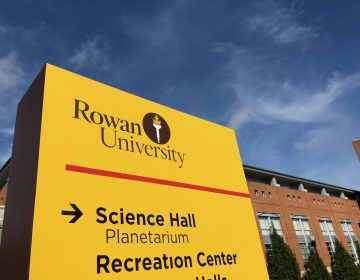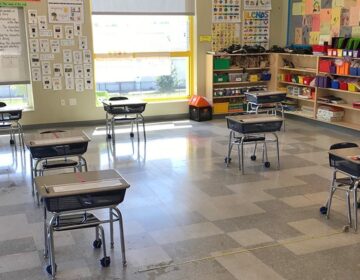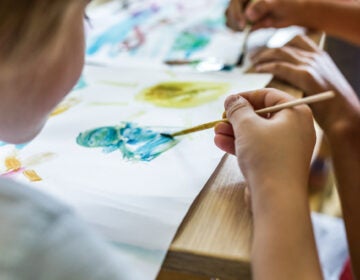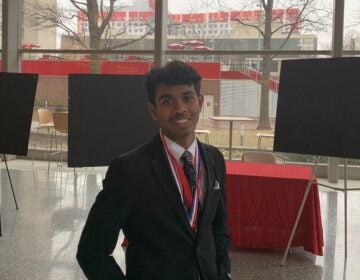Princeton High School students build STEM project to preserve Indigenous Guatemalan language
A group of high school research students aim to build sustainable plush animal robots to help preserve a vulnerable Mayan language spoken in Guatemala.
Listen 4:43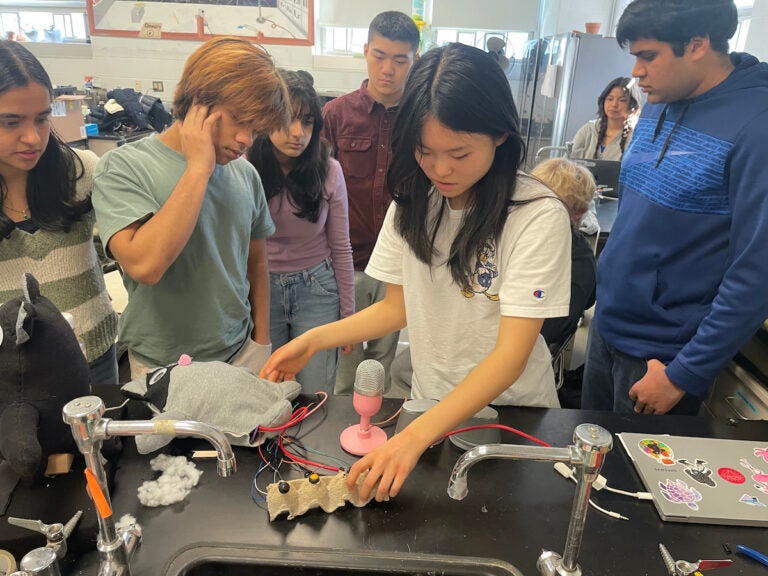
Some Princeton High School students working on of the prototypes they are developing for their entry in Samsung Electronics' Solve for Tomorrow competition (P. Kenneth Burns/WHYY)
From Camden and Cherry Hill to Trenton and the Jersey Shore, what about life in New Jersey do you want WHYY News to cover? Let us know.
Of the more than 7,000 languages spoken in the world, 90% of them are projected to disappear by the end of the century. That roughly translates to a language dying every two weeks.
A group of Princeton High School students are working to preserve one of those vulnerable languages. As part of their entry for Samsung Electronics’ Solve for Tomorrow STEM competition, the students are building an AI-powered robot in the form of a stuffed animal that people can practice and have conversations with.
They’ve developed two types of robots, said Matias da Costa, a junior who works on the robotics team.
“One that would work with buttons that would be used in places that had no internet access…[a] second set of robots [would] use ChatGPT and AI…it would use a microphone and you could actually speak to it,” he said.
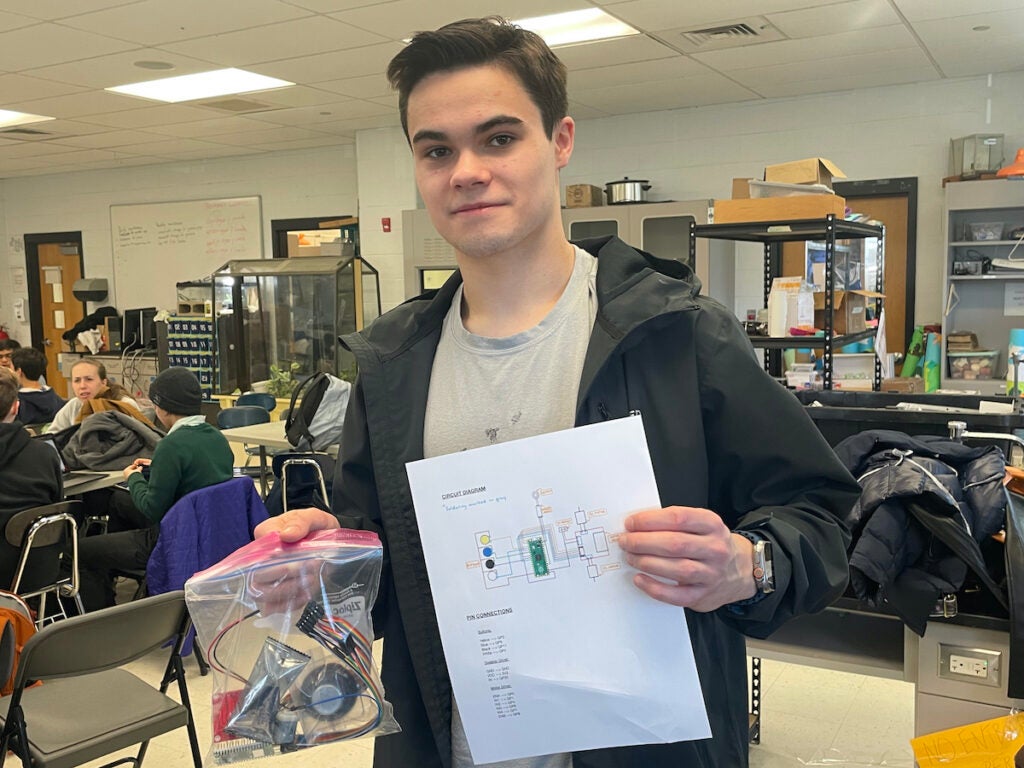
For the non-connected robots, a user would push a button to receive and respond to a pre-recorded prompt. The internet-enabled robots would use AI to process a response that would be translated through an algorithm written by the students.
“It would write the joke out and then it would translate,” da Costa explained as an example, “using the algorithm the programming team developed and that would process a joke that would be different every time so it’s not a repeated prompt.”
The Indigenous language the students are working to preserve is Mam, spoken by about half a million people in the western highlands of Guatemala.
Several students on the team are Mam speakers and come from Princeton’s small Mam community. Alexci Jiguan, a senior who immigrated from Guatemala four years ago, said the robot is important so that his children do not lose the Mam language.
“[I hope] we can distribute the robot to various parts around the country and in other countries,” he said through a classmate who translated for him.

The project could have an impact beyond Princeton. There are Mam communities in Morristown and in Oakland, California. The students recently showcased their project to the Mam community in Morris County and began a collaboration with them.
The Princeton team is vying for one of the top 10 spots at the nationals, which will take place in April in Washington, D.C. Selected teams will receive a $50,000 award. From there, three schools will each win a $100,000 grand prize.
As state finalists, the Princeton team has already won more than $14,000.
“This, I think, is by far technically the most ambitious thing that we’ve ever done,” said Mark Eastburn, a research and science teacher who is leading the students in the project.

Indigenous populations were victims of genocide during Guatemala’s four-decade civil war. They were targeted by U.S.-backed government forces as part of counter-insurgency operations.
Last December, the Congressional Research Service found that Indigenous Guatemalans continue to face social exclusion.
Daniela González, a senior who works on the project as a conversational language expert, is a native Spanish speaker from Guatemala. She studied another Indigenous language, Poqomam, for five years before her family immigrated to the U.S.
She recalled in third grade when she first heard a child speak a Mayan language.
“I always ask her if she can teach me something in her language and she always feel so shy,” she said.
González said she hopes the project will be a vehicle to tell the world about the Indigenous culture of her homeland.
“My personal goal is to tell the world how wonderful the Indigenous people are,” she added.
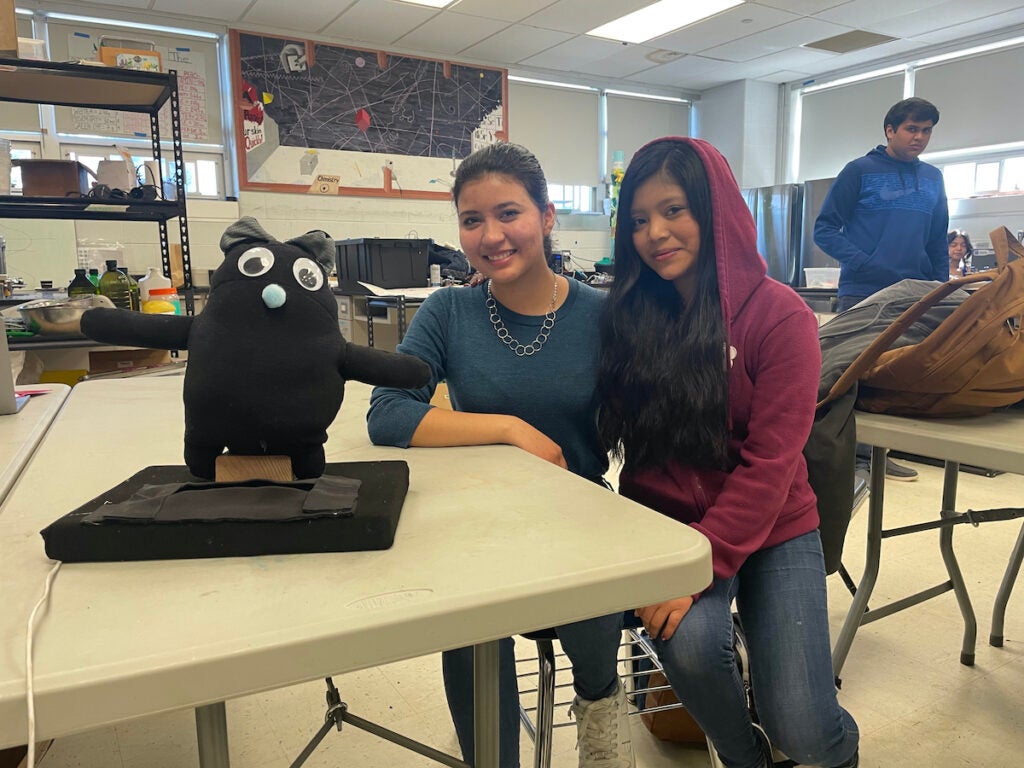
The robots will be built with sustainable, cost-effective and repurposed materials. While the prototype is $1,000, the students want to get the cost down to $20. They also want to ensure that the plush animals are ethically made.
“We are trying to work with a company, Fluffmonger, which focuses on ethical labor to prevent stuffed animals from being made in sweatshops,” said Rachel Guhathakurta, a senior who is building a website and working on marketing materials. “These robots would be made by people we know within the school communities in Guatemala to basically ensure that they don’t be made unethically.”
Beta testing will be done on Princeton High School students who are learning Spanish.
“We have students in very high levels of Spanish who struggle with day-to-day conversation because that’s not what is often taught,” said Hayah Mian, a junior who started the psychology section of the project.
She said students in the Spanish classes will spend about 15 minutes a day having a conversation with the robot outlining the mistakes made on their tests.
“After a two-week period, we’re gonna retest them and see if there was any significance with the robot,” Mian added.
A similar process will be implemented for English learners as the students fine tune the robots.
This is the third time that Princeton High School has participated in the Solve for Tomorrow competition. It is hoping to be named a national winner for the second time in its history.
In 2022, their winning project focused on using black soldier flies to break down food waste, demonstrating how the larvae can be converted to usable products such as animal feed and soap that rely on palm and coconut oil.
“Princeton High School’s classroom teams have been really ingenious in thinking about what’s going on in their community,” said Ann Woo, head of corporate citizenship for Samsung.
This is the 14th year of the Solve for Tomorrow competition, which she described as “a grassroots listening moment” to understand what kids are thinking about.
“Young people are listening,” she added. “They want to know what’s going on and they want to be part of the change that needs to happen.”

Get daily updates from WHYY News!
WHYY is your source for fact-based, in-depth journalism and information. As a nonprofit organization, we rely on financial support from readers like you. Please give today.



